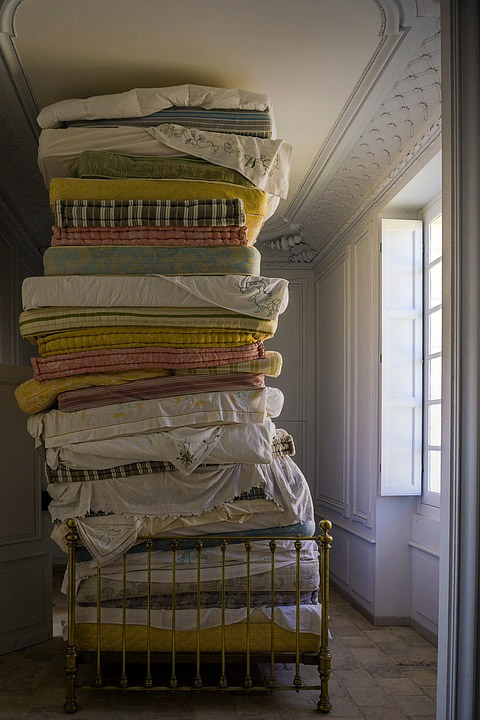If you find yourself wondering whether or not it is the time to replace your mattress, then the chances are –it is. There might not be a set of guidelines as to when you should replace your mattress, yet it is safe to suppose that a mattress, which is scratchy or shows some obvious ciphers of wear perhaps might need to go.
Together with the wear and tear, a change in the health and sleeping arrangements might also justify the necessity for a fresh, new, comfy mattress. Various allergens like dust mites may also accumulate on the bedding and mattress, providing the mattress a shelf life, more especially for those with respiratory conditions or allergies.
In this article, we will discuss mainly on how often should you replace the mattress and where to dispose or recycle them. Read on to learn more!
The General Guidelines
In accordance with the National Sleep Foundation, our mattresses have a lifespan of about 8 years. Contingent on the type and quality of the mattress, you might get more or lesser time from it. Whatever kind of mattress that is made with high-quality materials is likely to last longer.
The kind of mattress you buy can make a huge difference.
Waterbed
Waterbed mattresses may come in two different types, the soft-side, and the hard-side. The hard-side mattresses are the traditional kind of vinyl waterbed mattresses, on the other hand, the soft-side are the ones encased in the so-called foam box, which look much like the other mattresses.
Pillow-top
The pillow-top might provide an additional layer in between you and the mattress, yet it won’t essentially increase the lifespan of the mattress. The additional cushiony layer may break down over periods of time and may leave you with a sleeping surface that’s uneven.
Hybrid
The hybrid mattresses are a combination of innerspring mattress and foam. They commonly have a base foam layer, a top foam layer, and a coil support system. These don’t last as long as the other kinds of mattresses, yet the durability may be contingent on the base foam’s grade and the kind of coils.
Latex
The sturdiness of the latex mattress may vary contingent to whether you buy an organic or synthetic latex mattress. In fact, some latex mattresses may come with a warranty of as long as 20-25 years.
Memory foam
The foam mattresses may come in various densities and materials that may determine how well they’ll hold up. A high-quality memory foam mattress may last from 10-15 years with proper care.
Innerspring
The innerspring mattresses may contain coil support systems, which may help in distributing the weight equally across the mattress. These mattresses may last for up to 10 years, sometimes much longer if they are two-sided and may be flipped over for a more equally dispersed deterioration.
Why Replace Your Mattress?
There are several reasons for you to consider in replacing your mattresses, with the major one being comfort. Over a period of time, a mattress may lose its shape and start to sag, creating lumps and dips. A bumpy mattress may interfere with your own capacity in getting a good night sleep.
Not getting a sufficient amount of sleep, as we know, has already been associated with a number of illnesses, including:
- Diabetes
- Kidney disease
- Heart disease

Some allergens, like dust mites, may also accrue in the mattresses that may cause or even worsen the symptoms in people who have asthma, allergies, as well as some other respiratory illnesses.
When Should You Replace Your Mattress?

If you happen to notice any of the signs below, then it may be the time that you replace your mattress:
- You are putting more weight on the mattress. Gaining some weight may affect older mattresses and change the way you sleep
- You can feel that your partner is moving. Older mattresses may lose their ability in reducing motion transfer, thus causing you to feel more movement in the mattress when someone moves or turns over.
- Your asthma or allergies became worse. The mattresses are where most of allergens and dust mites at home live. This may wreak havoc and worsen asthma and allergies.
- Muscle stiffness. When the mattress is not comfortable and not supporting the body anymore, you might wake up feeling stiff and sore.
- Noisy springs. The springs on the mattress that squeak when you move is an indication that the coils are already worn and not giving the support you need anymore.
- Wear and tear signs. The indications of wear and tear like coils felt through the fabric, lumps, and sagging are clear signs that you should replace your mattress already.
How Often Should You Replace Your Mattress?
The durability of your mattress depends on the kind of mattress that you have. Frequently, the innerspring mattresses are just good for 6-7 years, even though they say that their lifespan is at 10 years or more.
Your conventional wisdom will state that you need to replace your mattress one in every 10 years. Naturally, this particular number will depend on how frequently you use your mattress and how well you take care of it. There are some mattresses that are particularly designed having long-term resilience and durability in mind.
In order for you to extend the mattresses’ life, it is so important that you take the right care of it. Rotating the mattress with the seasons may allow for equal wear. If you don’t want to replace your mattresses more often, but the best and high-quality mattress there is in the market.
How To Dispose or Recycle Your Mattress?
There are some ways that you can avoid adding your mattress to the over 132,000 sq. miles landfill space that is being taken up each year by freshly discarded mattresses. Before you even take your mattress into the trash, consider the following options:
- Junk removal series is possibly the best option if you have no recycling centers or charities in your area. The prices may vary among the local and national services. Some of these services may also have relationships with recycling facilities, thus using one does not spontaneously mean that your mattress may end up in the landfill.
- Some national and local charities accept some used mattresses that are in good condition. If you are going to replace a mattress that is still functional and clean, consider looking for a charity near you who are interested.
- Mattresses may be 80% to 90% recyclable and are being accepted by some recycling facilities. This is actually a local option that you can take, try searching and see for yourself. Most of the recycling facilities charge some fees. Nonetheless, recycling is not an option when your mattress is wet, stained, or being infested with some bed bugs.
Final Say
All of us spend approximately 1/3 of life in bed, getting a great sleep is important to bettering health. It might be tempting to just sleep on an old or insufficient mattress, yet replacing it may also lead to great benefits for health and sleep. If you experience tenacious pains and aches in spite of maintaining the mattress, talk to a health specialist or professional what might be causing these symptoms.




